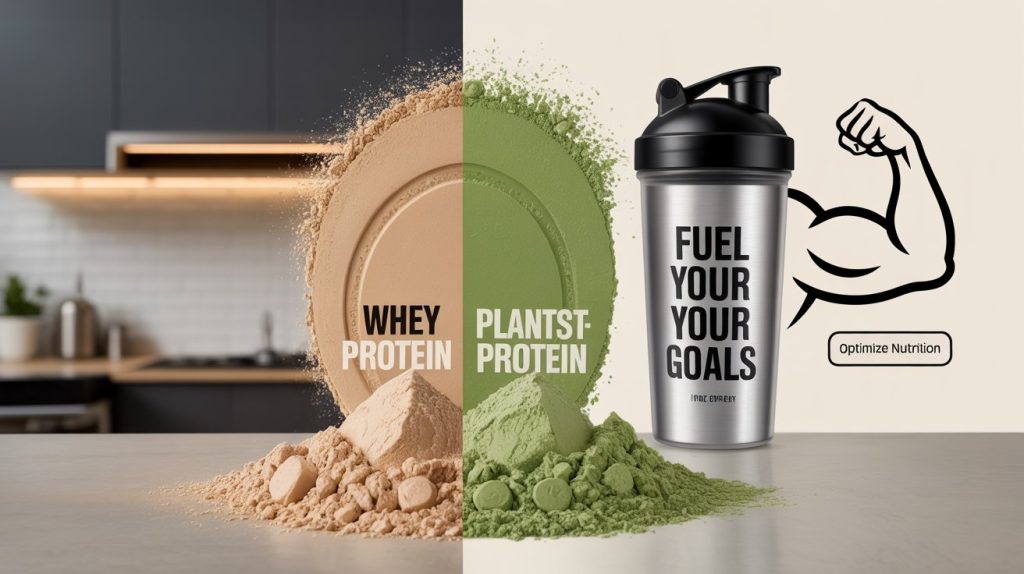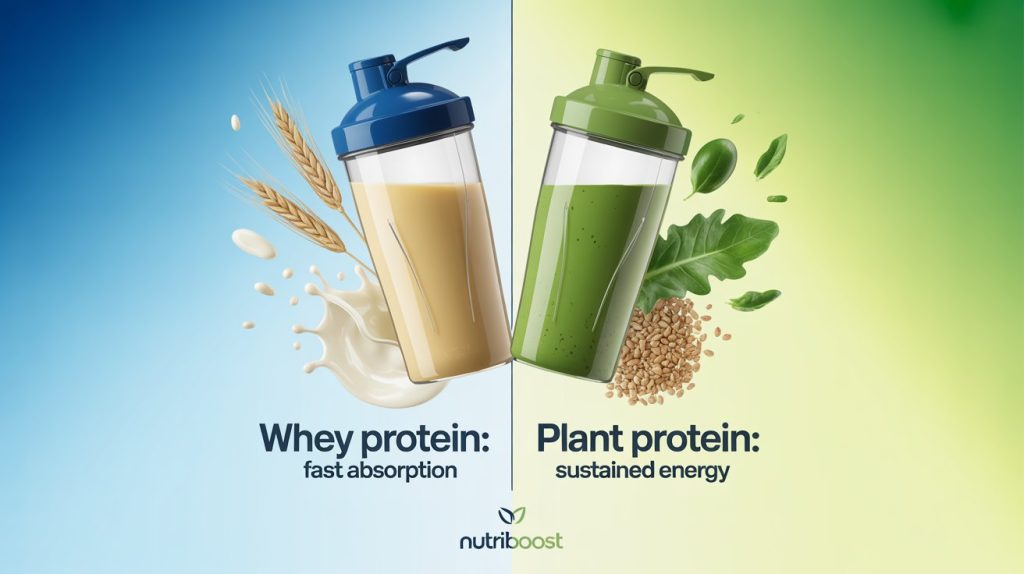Whey Protein vs Plant Protein : Compare benefits, muscle growth potential, and find the best fit for your fitness and nutrition goals
While the debate over whey protein and plant protein has been a long-standing topic in the fitness and nutrition world, the conversation continues. Both types of protein have their advocates, but which one truly reigns supreme when it comes to fueling muscle growth? This comprehensive guide will delve into the intricacies of whey protein and plant protein, exploring their benefits, drawbacks, and effectiveness in muscle building.
Understanding Protein: The Building Blocks of Muscle( Whey Protein vs Plant Protein )
First things first – before we delve into the fine details of whey and plant proteins, it is essential to understand why they are crucial for muscle growth and development. Protein consists of amino acids, which are necessary for muscle regeneration and growth. When we engage in sports, especially during strength training, we produce microtears in our muscle fibers. Protein helps these tears heal, which leads to stronger and larger muscles over time.
The Role of Complete Proteins
One of the most important considerations regarding the quality of protein is whether it is a complete protein. Complete proteins are the ones that contain all nine essential amino acids that our bodies can not produce on their own. This is where the distinction between whey and plant proteins often begins.
Whey Protein: The Gold Standard?
Whey protein has long been regarded as the gold standard for building muscle. However, what makes it so different from the rest?
Benefits of Whey Protein
- Whole proteins are there.
- They are rich in BCAAs (Branched-chain amino acids)
- Whey has the fastest rate of delivery
- Are you sure that it has muscle-building effects?
Whey protein is a milk by-product and is a whole protein, one that carries all essential amino acids. It is a mineral- and vitamin-rich source of leucine, a component the body needs to build muscle. The rapid digestion rate of whey protein makes it an excellent choice for post-workout recovery.
Drawbacks of Whey Protein
- The digestive problems occur in some people.
- Not suitable for vegans or people allergic to dairy
- Some plant proteins are cheaper than whey ones
Plant Protein: The Rising Star
Over the past few years, plant-based proteins have captured a significant market share, particularly among individuals following a vegan or vegetarian lifestyle. However, can they replace whey protein in terms of muscle building?
Benefits of Plant Protein
- Applicable to different dietary restrictions
- Or in some cases, foods tend to contain extra vitamins and fiber.
- The practice is likely more environmentally friendly
- The owner may need to retain a good balance of acid in a specific area of the body
Plant proteins are derived from sources such as peas, rice, hemp, and soy. Although not all plant proteins are complete proteins on their own, combining various sources can yield a full amino acid profile.
Drawbacks of Plant Protein
- In terms of whey, the bioavailability of some plant proteins is likely to be lower.
- A significant amount would need to be consumed for plant proteins to reach the protein level of whey.
- This is some sales talk, and it doesn’t inspire confidence in the product. In reality, meat is more satisfying, filling, nutritious, and tasty than plant protein.

The Science Behind Muscle Growth: Whey protein vs Plant Protein
One of the key anthropological reasons people seek a good protein source is the pursuit of muscle protein synthesis (MPS), a vital element in bodybuilding. Initially, various studies have compared whey with plant proteins to discover which of the two is the best in stimulating MPS.
Whey Protein and Muscle Protein Synthesis
The studies bring enough evidence that whey protein is a strong factor in the stimulation of the MPS. The Journal of Applied Physiology report found that whey protein maximizes MPS more than soy protein in young men after resistance exercise.
Plant Protein and Muscle Growth
Even if white protein were the only source of protein one could rely on, several current research studies suggest that plant proteins can also prove to be just as effective as whey protein when properly prepared. A 2019 study published in the “Nutrients” journal featured a combination of rice protein isolate and whey protein that was able to improve body composition and physical fitness to the same extent.
Combining Proteins: The Best of Both Worlds?
It is also a trend that, in current times, fitness enthusiasts are looking at complementary and combined elements of protein involved here. This idea is to utilize the advantages of both whey and plant proteins, while minimizing the weaknesses of each.
Benefits of Protein Blends (Whey Protein vs. Plant Protein )
- A more balanced profile of amino acids
- An enhanced rate of amino acids being sent to the bloodstream.
- Better uptake by specific individuals
- Numerous taste and texture options to choose from
Based on a published article in the Journal of Applied Physiology, a blend of whey, casein, and soy protein promoted the muscle protein synthesis for a longer time than whey protein alone.
Factors to Consider When Whey and Plant Protein Are the Only Options for Selection
So the question of whether it is worth taking whey or any of the plant-based proteins revolves around several factors:
1. Dietary Restrictions
The absence of animal products in these blends makes them suitable alternatives for vegans, individuals with lactose intolerance, and those with milk allergies. A person who continuously consumes milk might need to consult a physician before selecting the best diet to suit their conditions.
2. Digestibility
On the one hand, the small amount of whey protein may be simpler for some people to digest, while on the other hand, others may experience bloating and discomfort. Plant proteins can be gentler on the stomach for some people.
3. Environmental Concerns
The manufacturing of whey protein imposes higher levels of hazardous environmental effects than the production of plant protein does, which is the reason for its derivation from dairy products.
4. Taste and Texture
As it turns out, whey protein is widely loved for its smooth texture and nearly undetectable, as well as bland taste, compared to other proteins. The earthy flavor of plant protein may pose a pleasure to lovers, but certainly not to all takers.
5. Nutrient Profile
Whey protein provides many essential amino acids; however, it’s not the only rich source as plant proteins can fortify their originals with vitamins, minerals, or even fiber.

Maximizing Muscle Growth: Beyond the One Source of Protein
It is evident that one selection of protein among the many that might be there is one of the most critical factors; in any case, numerous other aspects fall into place, for instance:
- An adequate total protein intake
- Regular resistance training
- Timely relaxation and repair of the muscles.
- Balanced diet
- Healthy secretion of hormones
There is no point in considering only the type of protein and ignoring these other factors, as it is justified that this approach is less likely to yield the expected result.
Frequently Asked Questions
1. Is whey protein better than plant protein for muscle growth?
While the general perception of whey protein has been that it is the gold standard, recent research has also vindicated the efficacy of plant proteins. The best choice will be a combination of the two, where dietary restrictions, personal taste preferences, and a specific fitness goal will be decisive factors, with one factor outweighing the other.
2. Can I build muscle with only plant-based proteins?
Yes, an individual can acquire muscle through the consumption of plant-based proteins. Various athletes and bodybuilders have seen discernible muscle growth through a plant-based diet. The main thing is having a variety of plant protein sources to get all the essential amino acids and consuming enough total protein throughout the day.
3. How much protein do I need to build muscle?
The recommended daily protein-to-body-weight ratio for muscle building is 1.6 to 2.2 grams per kilogram. This can vary based on several factors, including age, gender, activity level, and overall health. It is optimal for an individual to consult with a nutritionist or dietitian to determine their specific needs.
4. When is the best time to consume protein for muscle growth?
However, is protein timing less crucial than overall daily intake? Consuming proteins within 30 minutes to 2 hours after a workout can help your muscles grow and recover more efficiently. In addition, supplying protein during the entire day gains you the maximum positive reinforcement of the process of muscle gain.
5. Are there any side effects of consuming too much protein?
The excess protein volume may result in stomach problems, the need for more water, and maybe kidney issues in some instances. The main thing is to follow the suggested amounts and not exceed them excessively. Always consult a health professional before making any drastic changes.
Conclusion: Finding Your Perfect Protein Balance
It is not a matter of deciding which one is the definite champion between whey protein and plant protein. This is because it is more about finding the right balance that corresponds to your physical condition, the objectives you set, and the lifestyle you lead. Both types of protein are beneficial and can be used effectively for muscle growth, provided they are consumed in the right way.
Some may be more interested in getting a combination of whey and plant proteins. They may also have dietary restrictions or personal preferences that make them inclined towards a plant-based approach. The idea is to ensure that you have sufficient, round-the-clock access to high-quality protein, which helps you achieve your muscle-building goals, regardless of the source.
Keep in mind that supplements are only one component of the muscle-building plan. A balanced diet, progressive weight training, sufficient rest, and proper hydration are essential for success during your weight training program.
Regardless of whether you choose whey protein, plant protein, or a combination of both, consistency is the most crucial element. Find the protein source that you enjoy, your body well tolerates, and that you can maintain on a long-term basis. Over and above, the best protein for muscle mass is the one that you would use consistently.
Thus, the process of building strength and health begins. Be sure to endorse your exercise routine, support your muscles, and enjoy a healthier, stronger you. The method of building muscle growth has its specific way for each individual. Rejoice in discovering the method that suits you best.


